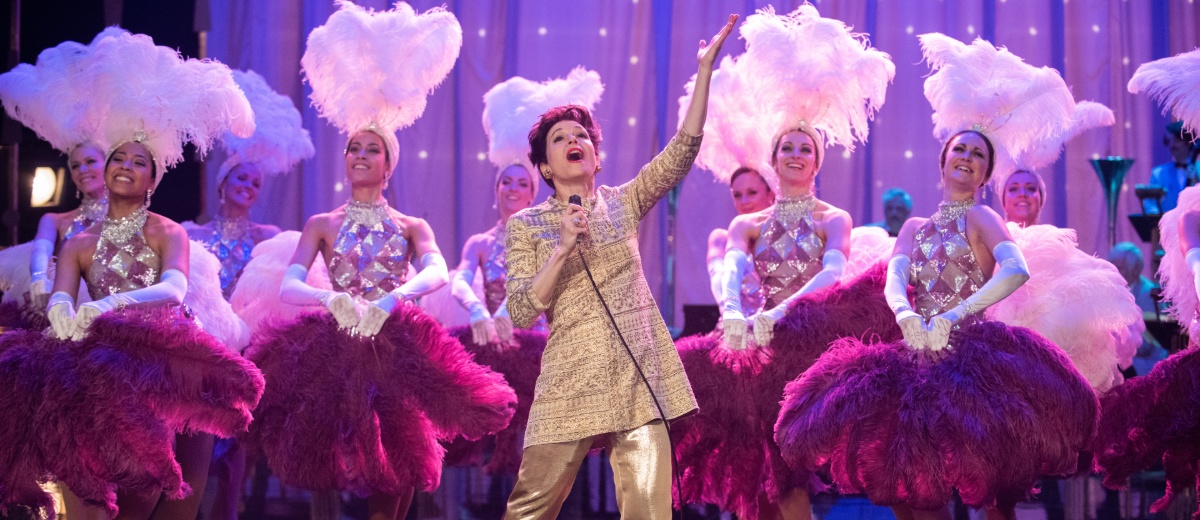“I was born at the age of twelve on the MGM lot,” Judy Garland once said. Adapted by Tom Edge from Peter Quilter’s stage play “End of the Rainbow,” director Rupert Goold’s big-hearted (yet semi-conventional) Garland biopic “Judy” follows the screen icon in the late-’60s through her final, troubled year of life, with a sensational Renée Zellweger in the lead. And yet, it starts with the very tearing of the cocoon Garland has famously spoken of.
READ MORE: Renée Zellweger shines in the ‘Judy’ trailer
With a smart and tone-setting opening, Goold lets us breathe in the vibrant Technicolor flowers and the yellow brick road that make up the set of “The Wizard of Oz.” Here a very young Garland auditions as Dorothy, the seminal role for which Shirley Temple (name-checked in the scene) was also considered. Goold closely captures the enormous eyes of Darci Shaw, the young actress who looks nothing like the pre-teen Garland but portrays her formative epoch superbly with innocent apprehension. We don’t get to hear her sing, but rather, see her react to studio mogul Louis B. Mayer as he mercilessly criticizes Judy’s physical features in a morally warped and misogynistic motivational speech. This would be the start of MGM’s systemic abuse of Garland, whose childhood was stolen, self-image poisoned, and lifelong addiction crisis kick-started with a variety of diet and sleeping pills.
READ MORE: Our 9 most-anticipated films of the 2019 Telluride Film Festival
While fans of Garland–or perhaps even casual admirers of the star–need no introduction to this upsetting background, Goold manages to make something cinematic out of it. Through a series of well-paced flashbacks, Goold seizes an emotional continuity in Garland’s life trajectory while mostly avoiding shallow sentimental pitfalls. He also makes sure this remains a Zellweger showcase through and through, perhaps instinctively knowing the metatextual appeal in seeing the versatile Oscar-winning actor in this role. After all, it wasn’t that long ago that Zellweger went through her challenges with the industry and press when her facial features were unfairly questioned. The captivating performer may not always look like Garland—her characteristically curvy lips still curl and pout in that lovable Zellweger way–but she still brings Garland’s relatable fragility and vulnerability to life with astounding precision and generosity. She nearly disappears in Garland’s visceral demons as well as recognizable bodily moves on the stage and beyond. And if you heard her grade-A pipes gracing “Chicago,” you won’t be surprised to learn that Zellweger does all the singing here, from “Come Rain or Come Shine,” to “Get Happy,” and naturally, “Over the Rainbow,” aptly saved for last in a purposely trembling stage performance that aims for the heart.
The stage in question is London’s glamorous nightclub Talk of the Town, where the 46-year-old Garland–frail, unstable and in deep financial trouble–had signed to perform for several weeks. This came after all doors (including the pricey hotels she resided at) closed on her face in Los Angeles. So while she battles her third husband, Sid Luft (Rufus Sewell), for the custody of her young children Lorna and Joey (Bella Ramsey and Lewin Lloyd, respectively), she accepts the invitation of producer Bernand Delfont (Michael Gambon) from across the pond out of necessity and finds herself in the care and close watch of Rosalyn Wilder. Wilder is played by a warm yet resolute Jessie Buckley; those who have fallen in love with Buckley’s voice in “Wild Rose” might secretly wish for a sidebar scene in which she sings (which, sadly, she does not). For Garland, these London-based weeks serve both as a jolt of energy and acceleration of an impending tragedy. On certain days, she aces her performances despite not being on the top of her vocal craft. On others, she shows up to the gig intoxicated and wobbly. Meanwhile, she embarks on a new romance with the much-younger Mickey Deans (Finn Wittrock), Garland’s fifth and last husband in a long line of unsympathetic life partners.
Mostly known for his theater work (rather than his underwhelming and miscalculated feature “True Story”), Goold directs “Judy” with a visible stage sensibility, predictably excelling during the Talk of the Town performance scenes. Throughout, Jany Temime’s well-researched costumes pop (pay special attention to those impeccable boat-neck dresses), cinematographer Ole Bratt Birkeland’s vivacious lens feels luxurious, and Melanie Oliver’s zippy editing helps the whole thing flow; this pacing is something lacked by comparable efforts “Film Stars Don’t Die In Liverpool” and “My Week With Marilyn.” If there is one missed opportunity here, it is Garland’s relationship with her daughter Liza (Gemma-Leah Devereux)—a single scene introduces her to the story, but ultimately feels like a lingering throwaway when further observations don’t follow. Garland’s status as a gay icon also goes underexplored. While the script invents a sweet friendship between the enigmatic star and a gay couple, this surrogate storyline feels somewhat simplistic to honor Garland’s influence on Stonewall.
Still, Zellweger’s poise and presence make the entire affair more than worthwhile. The actor said she didn’t necessarily see Garland as a victim. And she lets this perception inform her performance: bruised and broken, yes, but also as dignified and triumphant as Garland could be. [B+]
‘Judy’ opens nationwide on Sept. 27.
Click here for our coverage from this year’s Telluride Film Festival.





